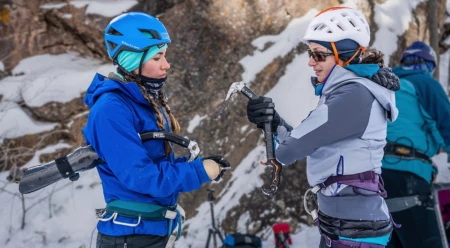Adventure Over Adversity
Paradox Sports Brings Accessibility to Climbing
As I labored under the weight of a heavy pack and took my turn breaking trail in the soft snow in the quest to establish a new route on a Himalayan peak, I was also mired in self-doubt. I was with three men who were much stronger than me, and who had offered to carry more of the group gear. But I insisted on dividing everything equally because I didn’t want to be a burden. I was wrestling deeply with wanting to carry my fair share, and knowing I wasn’t as powerful as them. That’s when I thought of the woman amputee whom I’d assisted in ice climbing in Ouray, Colorado, at a Paradox Sports event a few months earlier. She was determined not to let her disability inhibit her and she climbed to the top. I returned to that memory often during our expedition and have since volunteered several times for Paradox Sports. The inspiration has become a cornerstone of my strength.
Paradox Sports was founded in 2007 by Timmy O’Neill, D.J. Skelton and Malcolm Daly as “a place to connect, push limits and change beliefs about what is possible with a disability.” They chose to focus on climbing events because climbing “requires you to be present in both mind and body, and often the ‘disability’ holding you back is in the mind.”
This belief resonated with me and made me even more curious about what draws disabled women to climbing and how they deal with adversity, challenge and fear. In February, I had the opportunity to volunteer with Paradox Sports in Ouray and learned these insights from seven women:
Stacy, who has an incomplete L4 break, a fused L3-L5 and fused SI joints with resulting paralysis down her feet, legs and stomach had always wanted to ice climb because it seemed fun and adventurous. But after she broke her back, she thought she wouldn’t be able to do anything. Then she tried skiing and that opened doors. She decided to try ice climbing. If she couldn’t do it, at least she tried. She learned that she could do more than she thought and it gave her confidence out in the world. But she needs to be pushed to go outside of her comfort zone. “It takes someone to treat me like a normal person rather than an adaptive person,” she says.
Tatiana was born with cerebral palsy, which affects her legs—especially her calves and Achilles tendon. She decided to go ice climbing because she thought it would be good training for the Paraclimbing Nationals. She had heard about rock climbing from her nurses and fell in love with it because it made her stronger, gave her confidence and led her to an “amazing community.” She says she sees challenges as just another wall to climb.
Bee is a below-the-knee amputee, who suffered a bad break while bouldering. She says, “Being in the outdoors is a powerful part of me. I don’t feel whole without being outside.” After the accident, Bee tried to recover from multiple surgeries and it seemed that she would never climb again. Then she decided to have her leg amputated and was able to return to the crags. She felt as if she was given a second chance, and wanted to climb more than ever. There is a new challenge now, with having to learn ways of adapting to climbing with a prosthesis, not to mention that she has to bring extra parts in case something breaks. Each time she goes out, there is anxiety and doubt. She has to work harder. But she has learned to ground herself through her senses, acknowledge her doubts and keep going. “I have partners and a climbing community that encourage me, and that is important,” she says.
Esha was born blind. She was introduced to climbing through a school for the blind and through Paradox Sports. Climbing has also been part of her therapy for dissociative disorder, a condition that involves disruptions of memory, awareness, identity and perception. She says that climbing gives her confidence and keeps her grounded and in the present. Ice climbing in Ouray this winter was new to her and she is always game for new adventures. She came with an open heart, but expected it to be cold. “It was totally doable,” she says. She insists on taking things as they come, trying new things, trying her best and seeing how it works out.
Kim was born without fingers on her right hand. She had been trad climbing for three years before she learned about ice climbing. The problem was that she would need a prosthetic to hold an ice tool. It was the first time she felt truly disabled. She did not expect the feeling of empowerment when she finally climbed ice. She felt thrilled, capable, different, proud. She had refused to wear a prosthetic for 32 years, but now she says she is “honored to wear it.” She had a lot of fear about how she would initially be perceived by new climbers, but has sensed a shift in the climbing community, and they trust her to belay, build anchors and lead. She says, “My dreams have transformed into reality and I couldn’t have done it without the support of the outdoor community.”
Maureen Beck has been missing her right hand since birth. She shares gloves with Kim, since they are missing opposite hands. She was introduced to rock climbing at age 12 in the Girl Scouts and was immediately hooked. It clicked. She liked the fact that she wasn’t “supposed” to be able to climb, and this was her way of saying “screw you” to the world. She has gone on to win two Paraclimbing World Championships, a Paraclimbing World Cup and six Paraclimbing National Championships. She was also the star of Stumped, a movie about her first 5.12 lead. She was introduced to ice climbing through Paradox Sports and considers it harder, colder and scarier than rock. But she appreciates the good workout. Additionally, she considers ice climbing a special shared experience because there are still relatively few people who do it. What she fears is being uncomfortable—either physically or mentally. She explains, “For example, I am not good at face climbing. So I have to ask for advice, for help. But those turn out to be the most rewarding situations.”
Jessica was born with a condition that required her right leg to be amputated when she was 4 months old. She used to play tennis with able-bodied people. But when she took up rock climbing, she found that unlike tennis, she didn’t need any adaptive equipment. Ice climbing was much different than she thought it would be because, although she could make a foothold wherever she needed, it was exhausting to get into a mantle position to kick her foot. She loves the mental challenge of climbing and observes, “Everyone has an excuse—too short, lack of holds—so you kinda go ‘okay, that’s normal that you can’t reach that hold.’ You watch five different people on the same problem and each has her own way. People deal with adversity all the time. My motto is: aspire, adapt, achieve. You don’t know your own strength until it is tested. And yeah, I hear that I am an inspiration quite a bit. But it doesn’t mean anything unless it causes you to get off the couch and do something.”
I think back now to that experience in India, when I was struggling. No one escapes hardship in this life, whether chosen or not, but these women live on a daily basis with challenges that “able-bodied” women will never know. Maureen may say, “I don’t let myself be challenged by disability,” but for me, the challenge is an inspiration. If part of the value of their experience is to get me off the couch and to live as if I was given a second chance, as Bee expressed, then I will honor that—and them.
Thank you, Paradox Sports.

